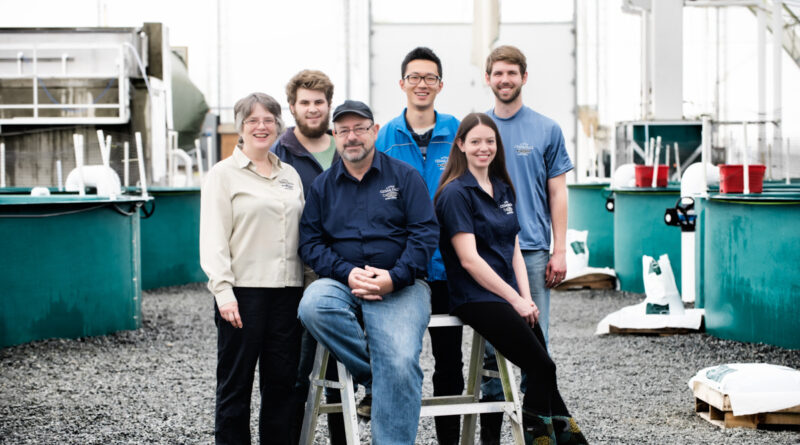Thinking small helps BC salmon farmer grow big
Technology to grow salmon on land on a large scale in BC is fraught with challenges and years away. So land-based salmon farmer, Steve Atkinson says he has another plan.
By Fabian Dawson
SeaWestNews
In a wooded area off the main artery that links Vancouver Island’s coastal communities, Steve Atkinson has been growing fish on land for almost two decades, while the debate over salmon farmers in BC’s oceans raged around him.
Here, Atkinson and his family have raised “Little Cedar Falls” branded Steelhead – a premium sashimi-grade product from their Nanaimo-based Taste of BC Aquafarms.
“The technology to replace ocean-based salmon farms to land based operations on a large scale is years away…nobody is doing it successfully on a large scale…the people behind the mega land-based farms are mostly about raising profits, not raising fish,” Atkinson told SeaWestNews.
But, Atkinson believes that there is a place for small to medium sized land-based fish farms to complement the production of ocean farmers.
“Our mission has always been to build and demonstrate a sustainable and profitable model for land-based salmon aquaculture at a small to medium scale,” said Atkinson.
“The focus was to build scalable RAS (Recirculating Aquaculture Systems) to produce between 100 and 400 tonnes of salmon, not the 100,000 tonne operations that some think can immediately replace ocean farming.
“Ours is a success story because it is not about building big, its about building successfully,” said Atkinson, after signing a deal with the Florida-based Blue Star Foods Corp to make his small idea, big.
“Our modular design strategy works and is highly scalable. I see no reason why the RAS Salmon production in BC cannot potentially exceed 100,000 metric tons annual production in the next two decades. Along with Blue Star, we intend to be leaders in this new industry,” said Atkinson.
“We believe land-based salmon farming can be part of the solution of healing our environment and will meet the gap between the growing global demand of salmon and a supply that is limited by its environmental impact, as well as geographical and governmental constraints,” said Blue Star Foods Corp. Chairman and CEO, John Keeler.
“We believe this opportunity is massive and has plenty of space for several participants,” he said.
This new deal comes in the wake of a government decision, driven by anti-fish farm activism, to phase out salmon farms in the waters of BC’s Discovery Islands. Initial industry estimates show that the closures will result in 1,498 job losses primarily in Vancouver’s North Island region and will impact about 700 businesses that service the farms.
Bernadette Jordan, Canada’s Minister of Fisheries and Oceans, made the decision without the input of the industry and local mayors and at the expense of science, including nine peer reviewed scientific studies which showed that salmon farms in the area, had only minimal impact on wild stocks migrating through the waters off Discovery Islands.
Atkinson called the decision short-sighted and based on the common perception that the technology currently exists to take the salmon farms out of the ocean and move them on land on a large scale.
“It simply is not so,” said Atkinson, adding that Atlantic salmon has not been successfully raised at commercial scales on land at a profit anywhere, other than at hatchery stage.
“You can’t be sustainable if you are not profitable,” said Atkinson, adding land-based salmon farming on a small to medium scale has a future in B.C. as a complement to ocean farming, not a replacement.
“The anti-fish farm activism in BC is to displace open-net cage salmon aquaculture. They are largely driven and financed by NGOs. I want to build a new industry, not displace an old one.”
In B.C. alone, there are many failed attempts to grow either Pacific or Atlantic salmon in land-based recirculating aquaculture systems (RAS) over the past 20 years.
One of them was by Terry Brooks, a veteran fish farmer in BC, who shut down his land-based Coho salmon farm last year, after trying to make a go of it for eight years.
“We just could not compete because of the costs and water and energy requirements,” he told SeaWestNews.
Brooks now has a successful Sablefish operation that has a hatchery on Salt Spring island with ocean farms in Kyuquot Sound on Vancouver’s Island’s west coast.
Last year, a government report said transitioning all open-net fish farms in British Columbia to land-based salmon farms operations is fraught with challenges.
The State of Salmon Aquaculture Technologies study said that land-based recirculating aquaculture system (RAS) technology requires the use of large amounts of land, water, and power, and thus has a significant environmental footprint, in particular greenhouse gas emissions.
Other challenges to land based RAS grow-out facilities include the global shortage of a trained workforce, fish health, brood stock development, stocking densities, and financial risks.
The report suggests that it will take years before we understand whether commercial-scale land-based operations can be profitable.
Farm-raised salmon is now BC’s highest valued seafood product, the province’s top agricultural export, and generates over $1.5-billion towards the B.C. economy, supporting about 7,000 jobs.
In BC alone, moving the current production of Atlantic salmon to large land based tanks will result in an increase 22,881,000 kgs of Greenhouse Gas (GhG) emissions. That is equivalent to the energy needed per year to power a population of 52,200 or a city the size of North Vancouver.
The cost of growing salmon on land in large tanks is also at least 12 times more that of raising fish in their natural environment.
Tellingly, there is no record of any new investments for large land-based Atlantic salmon grow-out facilities in BC, despite the claims of the activists.
(Steve Atkinson – centre front row – with his crew at the Nanaimo-based Taste of BC Aquafarms)

